Bangladesh attack: Shock over 'elite' Holey Cafe suspects
- Published
What we know about the attackers of the Dhaka cafe
Bangladeshi police are continuing to investigate Friday's deadly attack on a Dhaka cafe, amid shock at the elite background of most of the suspects.
They include the son of a government politician, along with university and elite public school students.
Twenty hostages, two policemen and six suspects were killed in the raid. One suspect was arrested.
The so-called Islamic State (IS) group said it was behind the attack but the government has denied this.
Nine Italians, seven Japanese, one US citizen and an Indian were killed in the 12-hour siege at the Holey Artisan cafe in the Gulshan neighbourhood. One Italian is unaccounted for.
A police officer injured in the shooting says he was fired on as he went to help an injured man
The Bangladesh bakery attackers
Is extremism on the rise in Bangladesh?
Searching for Bangladesh's 'affluent jihadists'
Bangladeshi Information Minister Hasanul Haq Inu told India's NDTV that "a majority of the boys who attacked the restaurant came from very good educational institutions.
"Some went to sophisticated schools. Their families are relatively well-to-do people."
One suspect is Rohan Imtiaz, the son of Awami League politician Imtiaz Khan.
The son had been reported missing by his parents after he disappeared in December. They recognised him from photographs of the attackers published in local media.

"I am stunned, dumbfounded" - a father's struggle to understand
Imtiaz Khan: "I am stunned. My son used to pray five times a day from a young age"
The father of one of the attackers has told the BBC of his shock at discovering his son was one of the attackers.
"I am stunned to learn this," said Imtiaz Khan, a leader of the Awami League's Dhaka chapter and deputy secretary-general of the Bangladesh Olympic Committee.
"My son used to pray five times a day from a young age. There is a mosque just 25 feet from our home. He started going to prayers with his grandfather. But we never imagined this. There was nothing at home, no books or anything to indicate he was leaning that way.
''The shock and suddenness of the event has left me speechless. I am so ashamed and sorry."
Rohan disappeared from the family home in December. "When I was searching for my son, I found that many other boys were missing - well-educated boys from good educated families, children of professionals, government officers. I used to share my sorrows with them," Mr Khan said.

Another dead suspect, Nibras Islam, reportedly attended the campus of Australia's prestigious Monash University in Kuala Lumpur in Malaysia, where the annual fee for a bachelor's degree is $9,000 (£6,700).
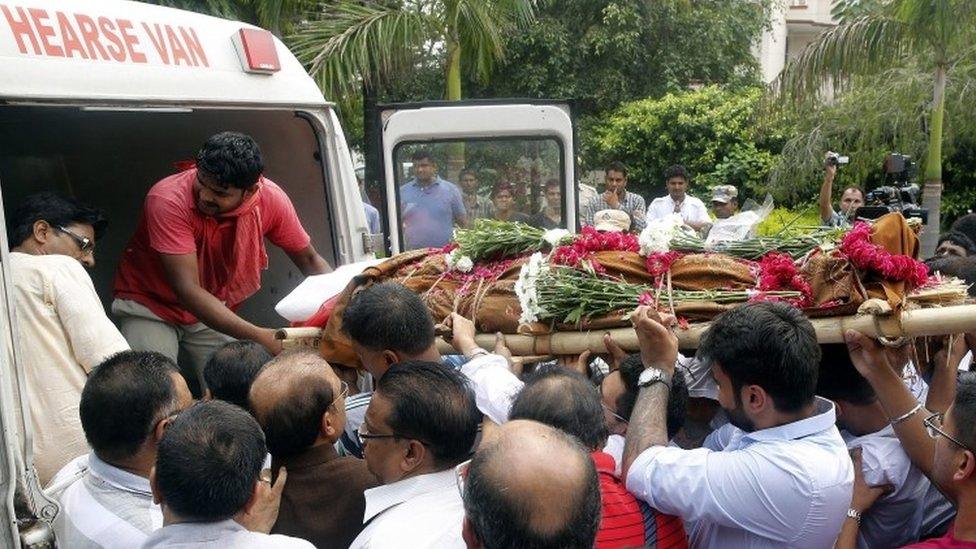
The body of 19-year-old Indian Tarishi Jain is taken for cremation
One student there told Reuters that Nibras Islam had appeared a normal student who loved taking photos of himself. He left last year and his social media activity tailed off. He did follow the Twitter handle of one Islamic State propagandist, Reuters reported.
Another suspect, Andaleeb Ahmed, has also been linked to Monash, having been in Malaysia from 2012 to 2015 and later in Istanbul.
Facebook posts and other sources named three other suspects as Meer Saameh Mubasheer, Khairul Islam Payel and Raiyan Minhaj.
Two of the six, Rohan Imtiaz and Meer Saameh Mubasheer, attended the elite Scholastica public school in Dhaka.
Meer Saameh Mubasheer's father told local media he feared his son had been brainwashed. "I felt in my heart that he was under someone's spell. We were good parents yet they took him away from our home," Mir Hayat Kabir said.
Analysts say the suspects' backgrounds would have helped them blend in easily in the upmarket diplomatic quarter.
They also say that is was previously believed that jihadists were poorer-educated men, radicalised in madrassa-style institutions. Only Khairul Islam appeared to be from a poor background.
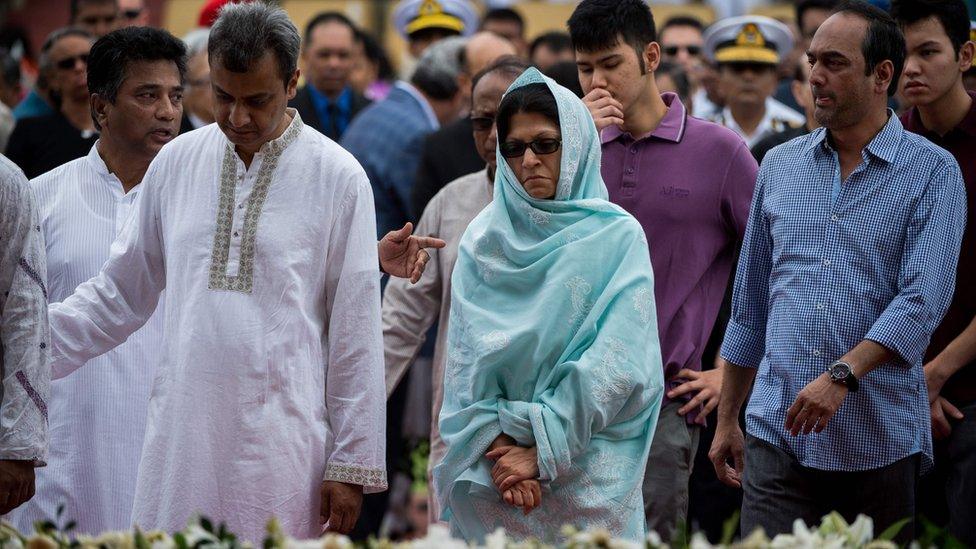
A memorial service for the victims has been held
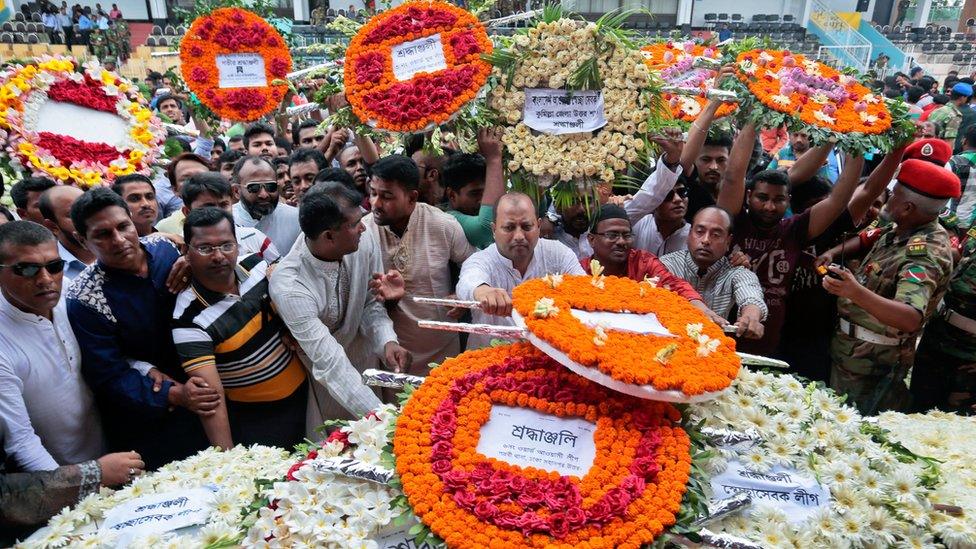
Local residents also laid wreaths at the memorial service
Home Minister Asaduzzaman Khan told Agence France-Presse it had become "a fashion" to join self-styled IS.
Nobody has yet claimed the bodies of the suspects and police have not confirmed identities.
The names given out by police - Akash, Badhon, Bikash, Don and Ripon - may be aliases used by the attackers to conceal identities.
Bangladeshi officials say the men belonged to a local banned militant group, the Jamaeytul Mujahdeen Bangladesh (JMB), but are investigating IS links.
Meanwhile one survivor, Gianni Boschetti, has described how leaving the cafe to take a phone call saved his life - but he lost his wife, Claudia Maria D'Antona.
"The last time I heard my wife's voice was when she called for me from the inside," Mr Boschetti told La Repubblica.
He hid in the cafe garden for hours. "I saw bodies in a terrible state, from beatings and sharp weapons, but not my wife's. Maybe she didn't suffer," he said.
One eyewitness said hostages were tortured if they could not recite the Koran,


Who are the victims?
Nine Italians named by the Italian foreign ministry as: Cristian Rossi; Marco Tondat; Nadia Benedetti; Adele Puglisi; Simona Monti; Claudia Maria D'Antona; Vincenzo D'Allestro; Maria Rivoli and Claudio Cappelli
Seven Japanese Five men and two women, four of whose names have been released by Japanese officials: Koyo Ogasawara, Makoto Okamura, Yuko Sakai and Rui Shimodaira
Four Bangladeshis Two were named in national media as Faraaz Ayaaz Hossai, a student at Emory University in the US, and Ishrat Akhond - the other two were policemen
US citizen Abinta Kabir, also a student at Emory University
One Indian Tarishi Jain, 18, who was a student at the University of California, Berkeley
- Published5 July 2016
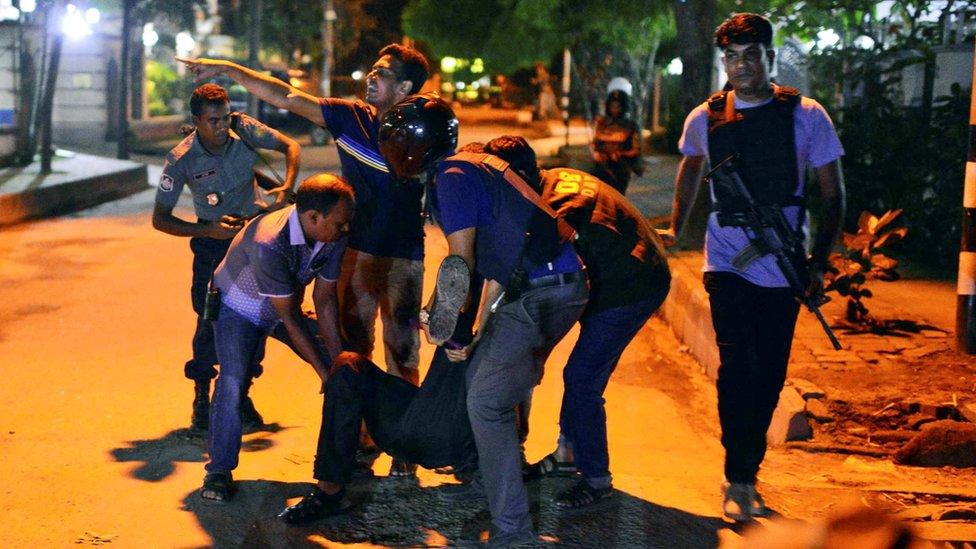
- Published4 July 2016
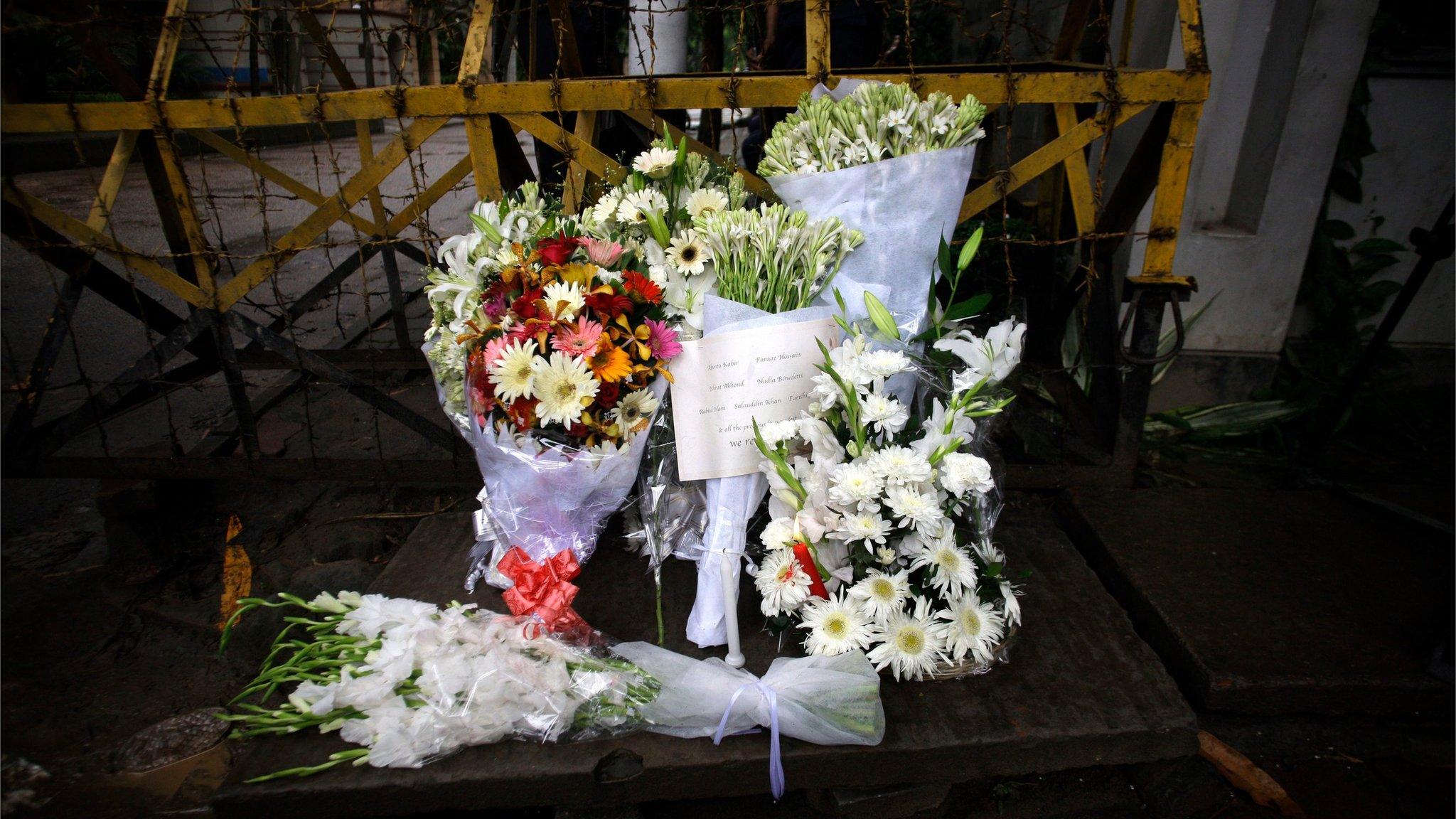
- Published2 July 2016
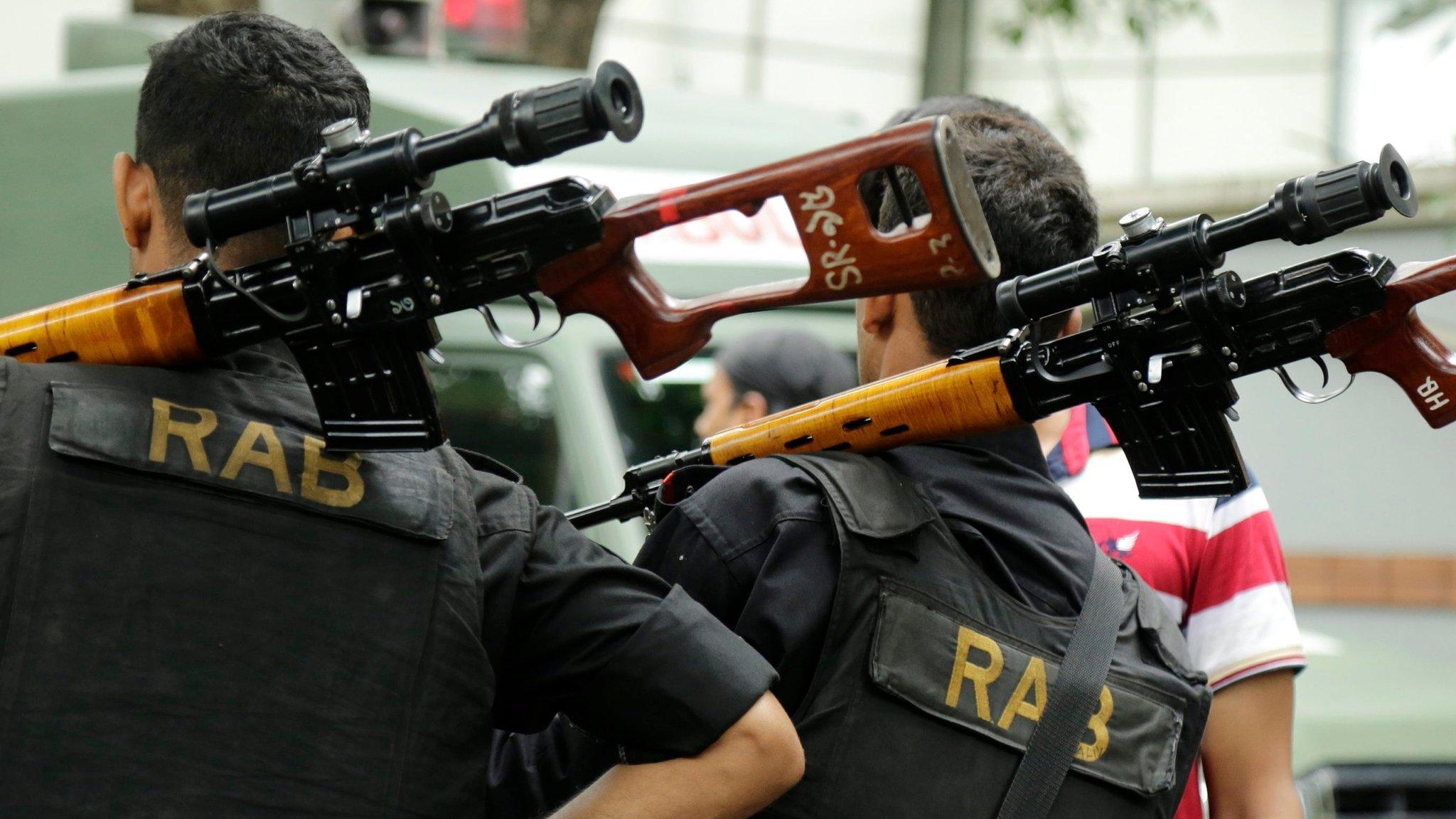
- Published5 May 2016
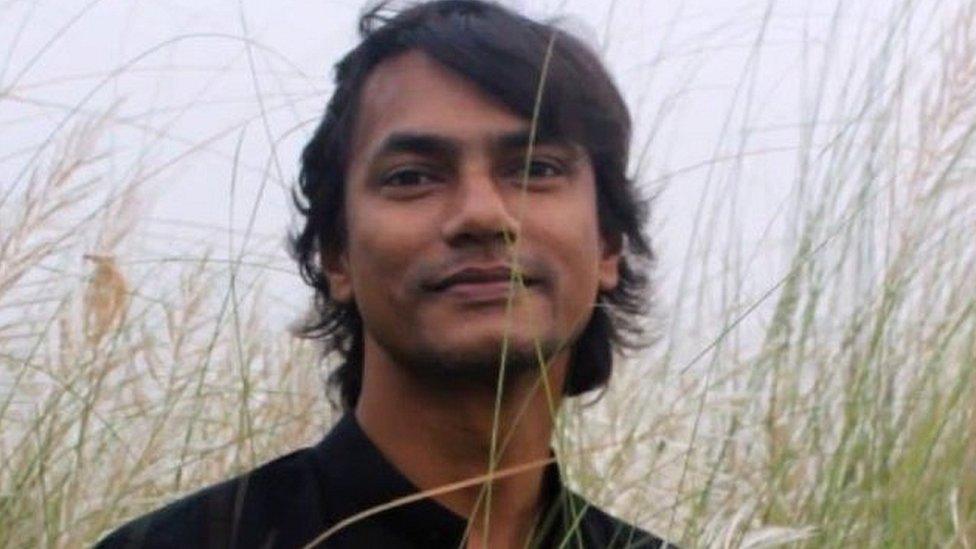
- Published1 December 2015
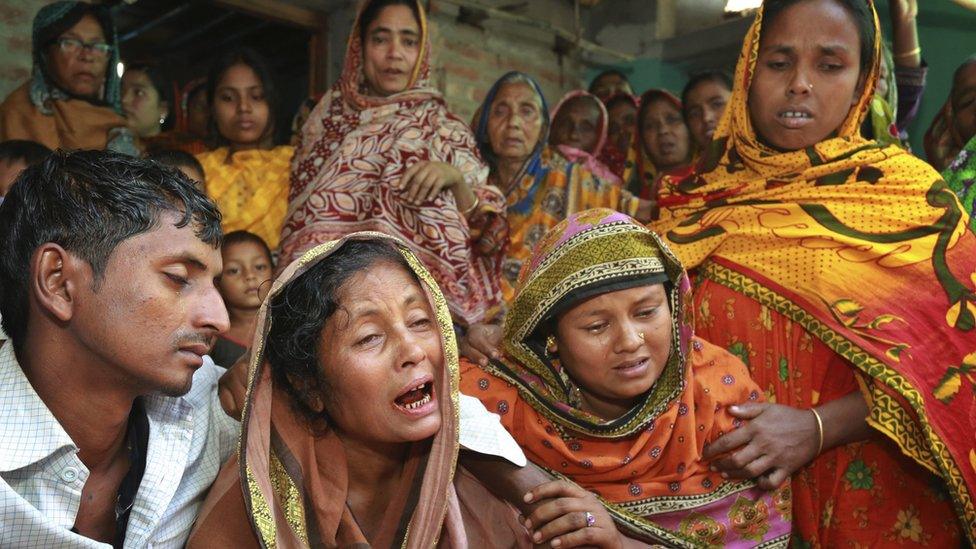
- Published1 December 2015